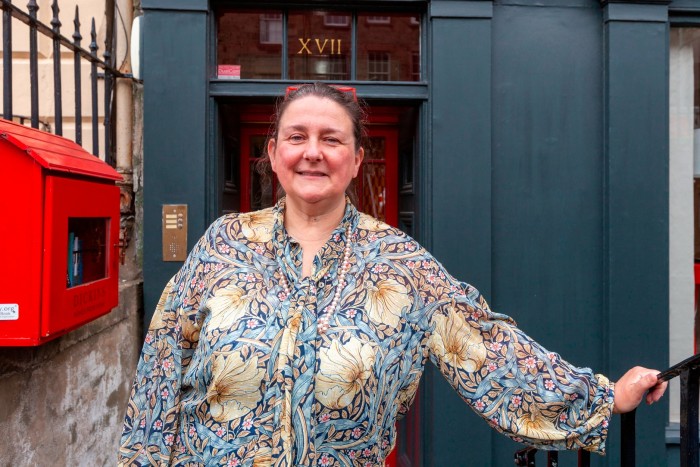Fiona Johnston was counting on her two short-term rental properties in Edinburgh to fund her retirement. But now the 63-year-old is worried that a crackdown on temporary lets will destroy her plans.
A new law requiring landlords to apply for a short-term letting licence before accepting bookings was passed last October, with the deadline to apply for licences extended until October 1, 2023. Johnston is one of many property owners who fear they will lose their livelihoods when the reforms take effect.
“It’s been extremely stressful and worrying because at my age nobody will employ me,” said Johnston, who previously worked as a policy analyst for the Canadian government. “I stand to lose my house if I can’t make my mortgage payments. I’m terribly worried about where I go from here.”
Tensions over short-term renting are playing out across the UK and Europe, with housing shortages sparking local opposition to holiday lets, such as Airbnb, and second homes.
The Scottish government initially drew up its legislation to combat antisocial behaviour in rented properties and to ensure that owners of short-term lets — including providers of temporary accommodation for workers or new employees — met minimum health and safety standards.
Supporters of the new rules say they will also help alleviate a shortage of rental properties for local residents by freeing up properties for residential use.
But opponents warn the regulations will cut off a valuable source of income for many ordinary Scots and limit the availability of accommodation for visitors.
According to the new rules, owners of existing short-term lets will be able to accept bookings while their request for a licence is pending. New hosts will be unable to rent their properties until they have secured a licence, potentially closing the self-catering sector to new entrants, warned landlords.
Scotland’s experience will be closely watched in England, where the UK government is also considering a registration scheme for landlords to ensure a “proportionate response” to community concerns over the shortage of homes available for longer-term rent.
But ministers in London have proposed a scheme that will exclude bed and breakfast establishments and “professional providers of self-catering accommodation”, while in Scotland licences will be required for all short-term lets.
The row in Scotland risks undermining first minister Humza Yousaf’s pledge to attempt to improve the pro-independence Scottish National party’s relationship with business.
Organisations representing landlords are already fighting rent controls imposed last year to protect long-term tenants. The Association of Scotland’s Self-Caterers, an industry body, said the letting regulations threatened a sector that contributes £867mn per year to Scotland’s £160bn economy.
“This [short-term lets] policy . . . endangers the wider Scottish economy by restricting the accommodation available for tourists and those visiting for other reasons,” said Conservative MSP Murdo Fraser.
The short-term let market recorded a three-fold increase before the Covid-19 pandemic, in the three years to May 2019, with about 32,000 listings on Airbnb alone, according to Scottish government data.
Landlords in Scotland warned that the new legislation would not only remove a valuable source of income for many ordinary people, but could leave thousands of visitors travelling to events such as concerts or the Edinburgh Festival stranded without accommodation.
Shona McCarthy, chief executive of the Fringe Society, which organises the festival, said the regulations had caused “fear and concern”. “In a time of [a] financial and cost of living crisis, it’s a really good boost for local people” to be able to rent out spare rooms while supporting artists, she added.
She said the Scottish government should consider excluding temporary shares and home lets from the licensing rules, because they did not effect the availability of housing for residents.
The Association of Scotland’s Self-Caterers said that not all short-term lets would be suitable for more permanent rentals, pointing out that they include “unconventional” properties such as boats, as well as rooms in homes.
Business owners have also complained that the regulations are overly complex because of provisions that allow local councils to impose additional measures, such as planning permission for some short-term lets in so-called “control areas”.
Edinburgh has become the first area to have this designation, and opposition to the new short-let regulations has been most vociferous in the Scottish capital.

Louise Dickins, who has run a short-term letting company in the city since 1998, was one of four petitioners to win a legal challenge to some aspects of Edinburgh’s scheme in June.
“There appears to be a genuine belief that reducing the number of short-term lets will increase the number of properties available [for long-term residents] and I would question that logic,” Dickins said, adding that the impact of the rules will be “catastrophic” for the economy.
Scotland’s Court of Session ruled that some aspects of Edinburgh’s policy, including a presumption against granting permission for short-term lets of whole flats within apartment buildings, was unlawful.
City of Edinburgh council said it would make changes to comply with the court ruling but would proceed with reforms to protect residents who have endured “years” of disturbance from short-term renters.
“It’s no secret that we face unique housing pressures . . . Short-term lets increase these challenges by reducing housing supply and increasing housing costs,” said Edinburgh council leader Cammy Day.
So far the city has approved just 111 applications for the new short-term let licences, with 119 pending according to the council. But council documents show there were 4,000 Airbnb properties listed in the city in October 2021, suggesting that many more landlords will need to apply.
A Scottish government spokesperson said “many” short-term lets had already obtained licences across Scotland and that visitors would benefit from properties meeting specific standards.
“We would encourage hosts considering letting or those already operating to contact the council where their accommodation is located to obtain more information about how to apply.”












